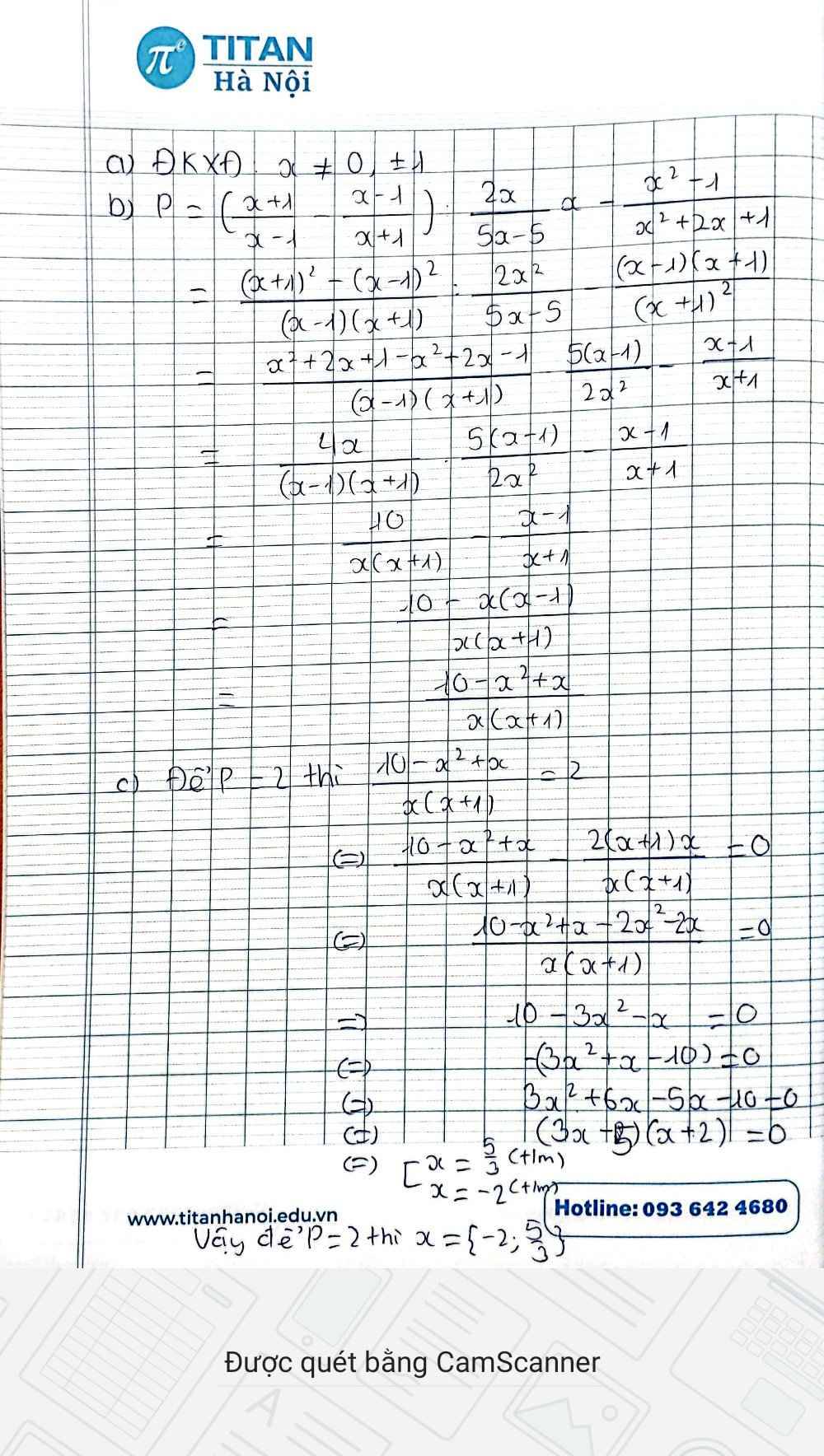Hãy nhập câu hỏi của bạn vào đây, nếu là tài khoản VIP, bạn sẽ được ưu tiên trả lời.

a) ĐKXĐ: \(x\ne1,x\ne-1,x\ne0\)
b) Do ĐKXĐ là \(x\ne0\) nên tại x=0 thì A vô nghiệm

\(a,ĐK:x\ne\pm1;x\ne2\\ b,A=\dfrac{\dfrac{0+1}{0-1}-\dfrac{0-1}{0+1}}{1+\dfrac{0+1}{0-2}}=\dfrac{-1+1}{1-\dfrac{1}{2}}=0\\ c,A=0\Leftrightarrow\dfrac{x+1}{x-1}-\dfrac{x-1}{x+1}=0\\ \Leftrightarrow\left(x+1\right)^2-\left(x-1\right)^2=0\\ \Leftrightarrow4x=0\Leftrightarrow x=0\left(tm\right)\)

Lời giải:
a. ĐKXĐ: \(\left\{\begin{matrix} x-1\neq 0\\ x+1\neq 0\\ 1+\frac{x+1}{x-1}\neq 0\end{matrix}\right.\Leftrightarrow \left\{\begin{matrix} x\neq 1\\ x\neq -1\\ x\neq 0\end{matrix}\right.\)
b. Tại $x=0$ thì biểu thức không xác định (theo kết quả phần a)

a) 2x−2=2(x−1)≠02x−2=2(x−1)≠0 khi x−1≠0x−1≠0 hay x≠1x≠1
x2−1=(x−1)(x+1)≠0x2−1=(x−1)(x+1)≠0 khi x−1≠0x−1≠0 và x+1≠0x+1≠0
hay x≠1x≠1 và x≠−1x≠−1
2x+2=2(x+1)≠02x+2=2(x+1)≠0 khi x+1≠0x+1≠0 hay x≠−1x≠−1
Do đó điều kiện để giá trị của biểu thức được xác định là x
a, \(2x-2\ne0\) khi \(2x\ne2\Leftrightarrow x\ne1\)
\(x^2-1=\left(x+1\right)\left(x-1\right)\ne0\) khi \(x+1\ne0\) và \(x-1\Leftrightarrow x\ne-1\) và \(x\ne1\)
\(2x+2=2\left(x+1\right)\ne0\) khi \(x\ne-1\)
điều kiên của x để giá trị của biểu thức được xác định là : \(x\ne-1\) và \(x\ne1\)
b, \(\left(\dfrac{x+1}{2x-2}\dfrac{3}{x^2-1}-\dfrac{x+3}{2x+2}\right).\dfrac{4x^2-4}{5}\)
= \(\left[\dfrac{x+1}{2\left(x-1\right)}+\dfrac{3}{\left(x+1\right)\left(x-1\right)}+\dfrac{-\left(x+3\right)}{2\left(x+1\right)}\right].\dfrac{4\left(x^2-1\right)}{5}\)
=\(\dfrac{\left(x+1\right)\left(x+1\right)+3.2-\left(x+3\right)\left(x-1\right)}{2\left(x+1\right)\left(x-1\right)}.\dfrac{4\left(x+1\right)\left(x-1\right)}{5}\)
= \(\dfrac{x^2+2x+1+6-x^2+x-3x+3}{2\left(x+1\right)\left(x-1\right)}.\dfrac{4\left(x+1\right)\left(x-1\right)}{5}\)
= \(\dfrac{10}{2\left(x+1\right)\left(x-1\right)}.\dfrac{4\left(x+1\right)\left(x-1\right)}{5}\)
= \(\dfrac{40\left(x+1\right)\left(x-1\right)}{10\left(x+1\right)\left(x-1\right)}\)
Vậy giá trị biểu thức được xác định thì nó không phụ thuộc vào giá trị của biến X

\(a,ĐK:x\ne-3;x\ne0;y\ne0\\ b,A=\dfrac{1}{x^2\left(x+3\right)+y^2\left(x+3\right)}=\dfrac{1}{\left(x^2+y^2\right)\left(x+3\right)}\\ x=y=0\Leftrightarrow A\in\varnothing\)

1.a)\(\frac{x^3}{x^2-4}-\frac{x}{x-2}-\frac{2}{x+2}\)
\(=\frac{x^3}{\left(x+2\right)\left(x-2\right)}-\frac{x}{x-2}-\frac{2}{x+2}\)
Để biểu thức được xác định thì:\(\left(x+2\right)\left(x-2\right)\ne0\)\(\Rightarrow x\ne\pm2\)
\(\left(x+2\right)\ne0\Rightarrow x\ne-2\)
\(\left(x-2\right)\ne0\Rightarrow x\ne2\)
Vậy để biểu thức xác định thì : \(x\ne\pm2\)
b) để C=0 thì ....
1, c , bn Nguyễn Hữu Triết chưa lm xong
ta có : \(/x-5/=2\)
\(\Rightarrow\orbr{\begin{cases}x-5=2\\x-5=-2\end{cases}}\Rightarrow\orbr{\begin{cases}x=7\\x=3\end{cases}}\)
thay x = 7 vào biểu thứcC
\(\Rightarrow C=\frac{4.7^2\left(2-7\right)}{\left(7-3\right)\left(2+7\right)}=\frac{-988}{36}=\frac{-247}{9}\)KL :>...
thay x = 3 vào C
\(\Rightarrow C=\frac{4.3^2\left(2-3\right)}{\left(3-3\right)\left(3+7\right)}\)
=> ko tìm đc giá trị C tại x = 3

a, Với \(x=3\)\(=>A=\frac{x-1}{2}=\frac{3-1}{2}=\frac{2}{2}=1\)
Vậy A = 1 khi x = 3
b, Ta có : \(B=\frac{1}{x}-\frac{x}{2x+1}+\frac{2x^2-3x-1}{x\left(2x+1\right)}\)
\(=\frac{2x+1}{x\left(2x+1\right)}-\frac{x^2}{x\left(2x+1\right)}+\frac{2x^2-3x-1}{x\left(2x+1\right)}\)
\(=\frac{x^2-3x+2x+1-1}{x\left(2x+1\right)}=\frac{x^2-x}{x\left(2x+1\right)}=\frac{x\left(x-1\right)}{x\left(2x+1\right)}=\frac{x-1}{2x+1}\)
Ta có : \(A=\frac{x-1}{2};B=\frac{x-1}{2x+1}\)
\(=>C=A:B=\frac{x-1}{2}:\frac{x-1}{2x+1}=\frac{2x+1}{2}=x+\frac{1}{2}\)
đề sai bạn ơi

`a, x = 0 <=> (0^2-1)/(2.0+1) = -1/1 = -1`
`b,` Biểu thức không xác định vì mẫu `= 0`